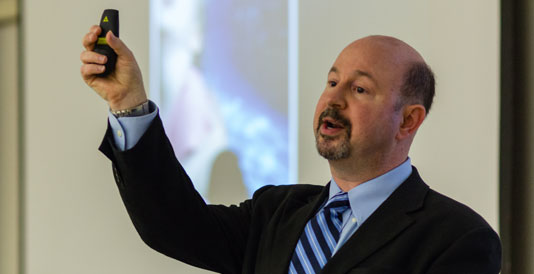 March 30, 2015 - What is the "false pause" in climate change data recently under debate? Distinguished Professor of Meteorology from Penn State Michael Mann presented his research to a rapt audience at a Geosciences Colloquium co-hosted by Center for Environmental Studies at Florida Atlantic University on February 27, 2015. Dr. Mann explained that the pause in the climate’s rise in temperature recently does not indicate a slowing in climate heating. Rather Mann and his team discovered an internal variability component--internal and forced low-frequency surface temperature variability at global and regional scales--that affects the climate directly and, when used in the climate models, does produce the false pause cooling we are experiencing now. It also indicates that the increase in temperature will begin soon and will be drastically hotter and more rapid than previously thought.
March 30, 2015 - What is the "false pause" in climate change data recently under debate? Distinguished Professor of Meteorology from Penn State Michael Mann presented his research to a rapt audience at a Geosciences Colloquium co-hosted by Center for Environmental Studies at Florida Atlantic University on February 27, 2015. Dr. Mann explained that the pause in the climate’s rise in temperature recently does not indicate a slowing in climate heating. Rather Mann and his team discovered an internal variability component--internal and forced low-frequency surface temperature variability at global and regional scales--that affects the climate directly and, when used in the climate models, does produce the false pause cooling we are experiencing now. It also indicates that the increase in temperature will begin soon and will be drastically hotter and more rapid than previously thought. Mann said recent climate cooling is not a slowdown of our climate warming rate. Instead the false pause is part of the internal variability of the climate neglected in past models. Neglecting internal variability has created a false sense of hope and failure to prevent harmful habits discouraging anthropogenic forcing. Typically used procedures for isolating natural internal oscillations like the Atlantic- and Pacific-based internal multidecadal variability (termed “AMO” and “PMO,” respectively) do fail when tested in a model-based framework where forced and internal variability are both known prior. The AMO signal is at the maximum shallow and the PMO is trending drastically downward.
The discovery, which led other researchers to similar conclusions, explained why the climate has been so cold this past winter compared to the last 5 years. It also explained how the natural, internal climate variability has a huge effect on predicting future climate and why the climate research community had not been in doubt of this component before. Many models incorporating the internal variability got the same results. Cooperation among the climate research community has led to great advances in a short time. Mann explained how the models run with thousands of parameters run by a single computer would have taken a year for produce result. Instead, a group of intelligent people collaborated for an important discovery.
The team reported their results in Science: http://www.sciencemag.org/content/347/6225/988.short












